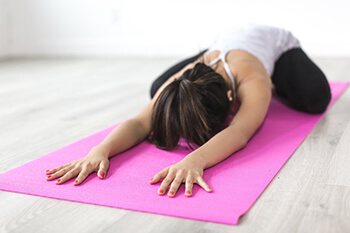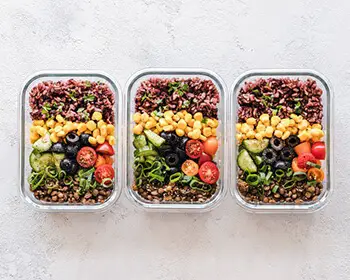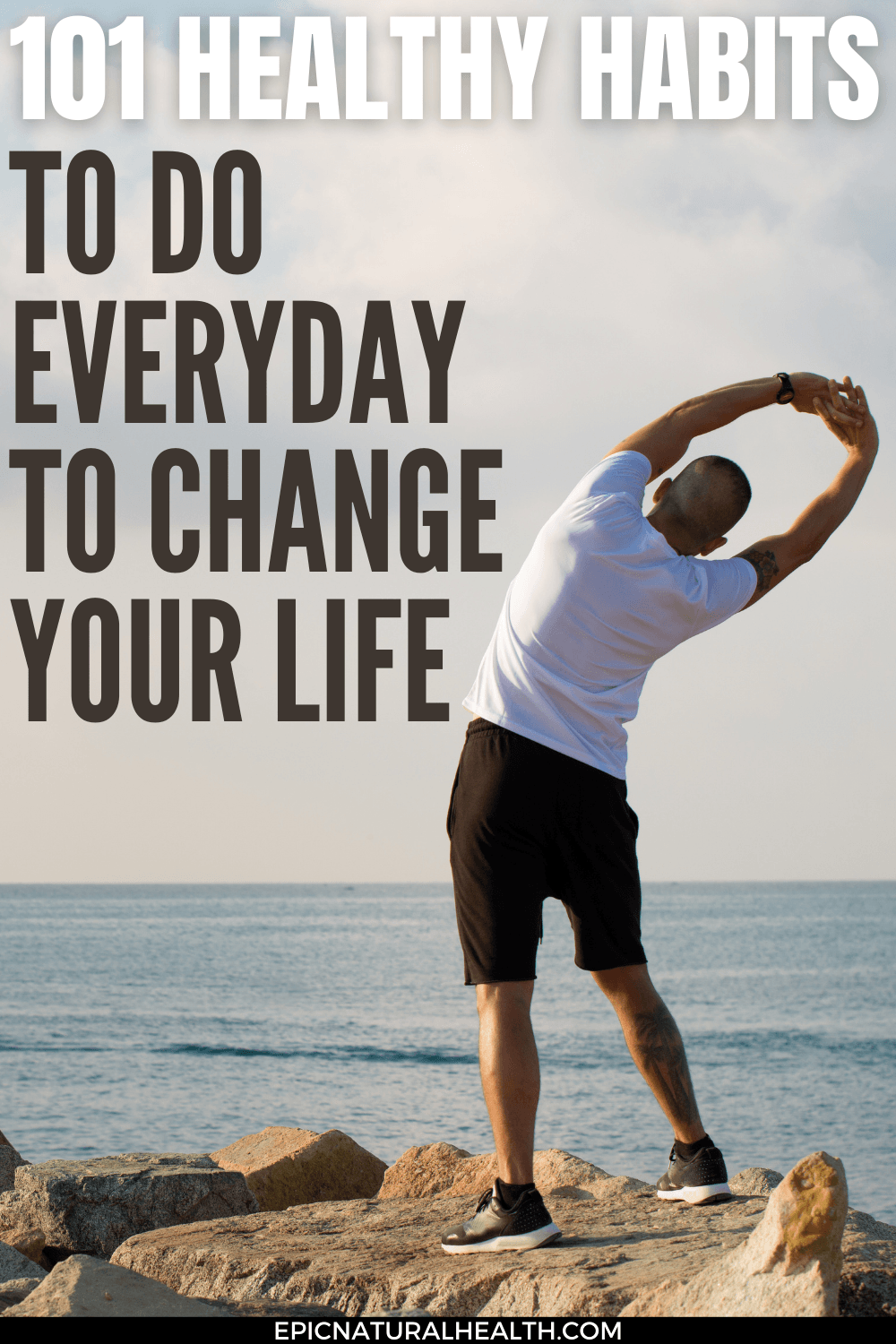Every day you make choices. Those choices create your thoughts and actions. Your thoughts and actions develop your habits – and your habits define your life.
If you consider many of the activities of your day, you'll see they can all be divided up into good and bad habits you've developed over the years. Some of them were developed in childhood through lessons and instructions from your parents — like tying your shoes, brushing your teeth before bed, and combing your hair.
Other habits are created through our general life experiences, our work, influences from friends and peers, and social expectations. Even bad habits can be picked up from the influence of others. Smoking, for example, has long been a social habit. If our parents watch too much TV, we’re also likely to do the same.
Once a behaviour is repeated enough, we create new neural pathways in our brains to make the habit automatic — and very difficult to break. For the same reasons, good habits are hard to form. We have to reverse engineer the process, mindfully adopting new behaviours and repeating them enough that they become automatic and our brains adapt.
Luckily, you can learn the skills of habit creation and use them to improve your health and wellbeing in a whole range of areas. Stay tuned for our list of 101 healthy habits you can adopt today.
First, let’s start with fitness habits:
1. Take a walk every day.


Walking is a great way to improve or maintain your overall health. Just 30 minutes every day can increase cardiovascular fitness, strengthen bones, reduce excess body fat, and boost muscle power and endurance
2. If you sit much of the day, stand up from your desk every 30 minutes and do 5 minutes of movement.
Stretching should be an integral part of your working day, as it maintains flexibility and joint range of motion, and improves your circulation. When you stand up, even the briefest of movements, like walking to the coffee machine to turn it on, is important.
3. Stretch for 5 minutes first thing in the morning or after your shower.


Stretching first thing in the morning has a calming effect on your body. Stretching is also a great way to stay in shape, become more flexible and relieve sore muscles. It also helps relieve stress, anxiety, improve digestion, soothe headaches and improve your overall health.
4. Practice 10 minutes a day of aerobic exercise, like running, jumping jacks, dancing, or swimming.


Studies have found that this type of exercise, which gets your heart rate up, reduces the risk of many conditions, including obesity, heart disease, high blood pressure, type 2 diabetes, metabolic syndrome, stroke, and certain types of cancer.
5. Practice 10 minutes a day of muscle-strengthening activities, working different muscle groups each day.
Muscular strength enhances overall health and boosts athletic activity. A strong body allows you to perform movements and activities that require power without getting tired.
6. Park your car farther away from entrances to work or stores.


Think about it this way—you can burn an extra 10 calories every time you walk from your car to the store or office by parking farther away. If you do that five times a day, it adds up to more than 18,000 calories over a year—or roughly an extra five pounds, depending on your body weight.
7. Take the stairs instead of the elevator.
There are a whole host of benefits to climbing stairs. Studies have shown that simply choosing the stairs over the elevator can improve the amount of "good cholesterol" in the blood, increase leg power, and may even be an important priority in reducing the risk of injury from falls in the elderly.
Stair climbing can also help you achieve and maintain healthy body weight.
8. Run or jump on a rebounder for 30 minutes a day.
Rebounding, or jumping on a tiny trampoline, is really fun and great for your overall health! It can help to jumpstart your metabolism, and can cardiovascular health by improving blood flow, conditioning, and strengthening the heart.
In some cases, it can reduce blood pressure, and it also helps to tone and strengthen many muscles throughout the body with low impact on joints and ligaments.
9. Find a running buddy and begin running every other day, starting with a speed-walk if you are new to running.
Since it improves aerobic fitness, running is a great way to help improve cardiovascular health. Plus, it burns calories and can build strength, among other things.
It’s difficult, to begin with, but once your body and mind start to acclimate, running can be blissful, meditative, and provide a sense of freedom.
10. Take a fun exercise class like Zumba or Jazzercise.


Exercise doesn’t have to be boring. Fun exercise classes like Zumba feel more like you’re at a particularly exuberant party, and they’re great for your health, too.
Zumba, for example, targets lots of different muscle groups at once for total body toning. The high-and low-intensity intervals make Zumba an excellent cardio workout.
11. Join a community sports team, like softball, basketball, soccer, or volleyball.
Community sports build endurance, improve balance and coordination, and help you to develop concentration and self-discipline. Research has also found that team sport and recreation builds stronger, healthier, happier, and safer communities, so do it for your local town if not for yourself!
12. Find an outdoor habit you enjoy like biking, hiking, or inline skating.


Spending time in forests, hiking in mountains, and just being outside can lead to significant health benefits. Studies have shown that walking in the woods can improve blood pressure, boost mental health, and decrease cancer risk.
If you find a hobby other than walking that you can enjoy outdoors, like biking or rollerblading, even better for you.
13. Perform a specific number of sit-ups and/or push-ups every morning before your shower.


Sit-ups target your abdominal muscles, while push-ups also aid in strengthening your core muscles, which are engaged while helping to support and stabilize your body. Making a habit of setting your alarm ten minutes earlier so that you can fit in sit-ups and push-ups before breakfast is a fantastic healthy habit to adopt, and you’ll feel great when you see you’re making progress.
14. Walk or jog in place while watching TV, rather than sitting.
When you exercise while you watch TV, you don't have to move the entire time to burn mega calories. You might want to set up your workout so that you do vigorous movements during commercial breaks and rest while your show is on.
Otherwise, simply walking on the spot while watching TV will do your body a world of good.
15. Have sex regularly.
Regular sex relieves stress, boosts immunity, is thought to burn 85 or more calories per 30 minutes, improves cardiovascular health, reduces pain, lowers the risk of prostate cancer, and helps you sleep. Sex can also boost emotions like love, affection, and euphoria, which are key to a healthy relationship.
Moving onto our healthy eating habits:
16. Drink an 8-ounce glass of water first thing in the morning.


The six to eight hours of recommended nightly sleep is a long period to go without any water consumption. Drinking a glass or two of water right when you wake up, however, is a good way to quickly rehydrate your body.
17. Keep a full water bottle on your desk and drink water throughout the day.
Drinking 3 litres of water per day should help you meet your hydration needs to support better health. Drinking enough water is important for many aspects of health, including body temperature, nutrient transport, and brain function.
Buy yourself a 3 litre water bottle if you need motivation to drink enough.
18. Substitute one unhealthy food choice for healthy food.


Instead of snacking on chips, for example, opt for carrots with hummus. You don’t have to cut out all of your unhealthy snacking habits – we all deserve a treat – but if you know snacking is an issue for you, start by cutting out your worst foods one by one. Your body will thank you for it.
19. Add one additional serving of vegetables to one of your daily meals.
Vegetables are a good source of vitamins and minerals, including folate, vitamin C, and potassium. They're an excellent source of dietary fibre, which can help to maintain a healthy gut and prevent constipation and other digestion problems.
If you’re not getting your 5-a-day at the moment, start small and add one extra portion of veggies to each of your meals per day.
20. Increase dark green leafy vegetables in your diet like kale, spinach, swiss chard, and mustard greens.


Eating a diet rich in leafy greens can offer numerous health benefits including reduced risk of obesity, heart disease, high blood pressure, and mental decline. Add them to your salads or whip them up into a smoothie if you’re not a fan of their texture.
21. Drink a cup of green tea every day.
Green tea, which is packed full of health-promoting compounds, has often been dubbed the healthiest beverage on this planet. Regularly drinking green tea can help you lose weight and reduce your risk of several diseases, including diabetes, heart disease, and cancer.
Drinking 3 to 5 cups of green tea has been found to be the most beneficial, but you will still notice a difference from a single daily cup of tea.
22. Eat smaller meals more frequently throughout the day.


When digestion is complete, glucose is carried by the bloodstream and throughout the body to supply our cells and organs with energy. When blood glucose levels drop, hunger and cravings spike.
By eating six small meals per day, the thinking goes, you're ensuring that blood glucose is available at all times. This will help you to manage both your hunger and your weight.
23. Substitute a lean protein like chicken or fish for red meat once a week.
Cholesterol and saturated fat can raise your blood cholesterol levels, which in worse cases may trigger heart ailments. Chicken and fish have less saturated fat than most red meat and oodles of protein which makes them one of your best companions when on a healthy diet.
24. Substitute fruit for a high calorie, sugary dessert.


If you have a sweet tooth and find yourself reaching for a sugary dessert after meals, opt for a piece of fruit instead. Fruits contain natural sugars, which will help to satisfy your craving with much fewer empty calories.
One study even found that people reported feeling happier, more purposeful, and less anxious when they ate more fruit.
25. Clean out your pantry and get rid of all processed snacks.
Buying processed foods can cause you to eat more than the recommended amounts of sugar, salt, and fat as you may not be aware of how much has been added to the food you are buying and eating. These foods can also be higher in calories due to the high amounts of added sugar or fat in them.
The best thing you can do for your mind and body is to limit your consumption of these foods entirely.
26. Go to the grocery store on a full stomach only.


Grocery shopping when your stomach is rumbling is probably not a good idea. To hungry shoppers, high-calorie foods may be more tempting than usual, according to a recent study.
You're bound to make poor decisions that are not based on the nutritional content of a food item.
27. Eat breakfast every day, including a combination of complex carbohydrates, fibre, protein, and a small amount of fat.
Breakfast is often called 'the most important meal of the day', and for good reason. As the name suggests, breakfast breaks the overnight fasting period.
It replenishes your supply of glucose to boost your energy levels and alertness, while also providing other essential nutrients required for good health.
28. Reduce your serving portions at lunch or dinner by half.
Portion control is important because it helps you digest food easier, reach or maintain a healthy weight, stay energized throughout the day, and control blood sugar levels. Sit for 15 minutes before adding more food to your plate, as this will give your food time to digest.
Only if you're still hungry should you consider eating more.
29. Once or twice a week, eat a 100% plant-based dinner.


A diet centeredentred on plenty of whole, minimally processed plant-based foods is beneficial for our overall health. Plant foods like vegetables, fruit, whole grains, legumes, nuts, and seeds are low in saturated fat, contain heart-healthy fats, and are a great source of fibre.
Plant-based foods are much more interesting than they’re given credit for, and you might find that you’re opting for your plant-based meals more and more frequently as you start getting creative with new recipes.
30. Switch from white, bleached bread and grains to whole grains.


Refined carbohydrates, AKA white bread, pasta, and rice, have the bran and germ are removed from them during the refining process, along with all the nutrients they contain. This leaves almost no fibre, vitamins, or minerals in the refined grains.
Whole grains, on the other hand, are not subjected to this treatment and are packed with nutrients including protein, fiber, B vitamins, antioxidants, and trace minerals like iron, zinc, copper, and magnesium. A diet rich in whole grains has been shown to reduce the risk of heart disease, type 2 diabetes, obesity, and some forms of cancer.
31. Begin a practice of eating more mindfully and slowly. Take twice as long to eat your meal.
Mindful eating won’t only help you to lose weight – studies have found that it has the capacity to ameliorate depression, anxiety, faulty eating habits, food cravings, eating disorders and weight management. Not only that but it has been proven effective to control some chronic health conditions like type 2 diabetes.
32. Reduce the amount of alcohol you drink. Consider having it only on weekends.


Alcohol can kill your energy in multiple ways. As well as giving you a hangover, it affects the quality of your sleep, making you feel more tired the next day.
33. Cook with coconut oil rather than butter.
Coconut oil has a high content of saturated fat lauric acid, which makes it highly resistant to oxidation at high heat. For this reason, it is much better for high-heat cooking methods like frying than butter, an unhealthy fat that has been linked to a reduced risk of obesity, diabetes, and heart problems.
34. Choose air-popped popcorn as an evening snack.


When it's air-popped and lightly seasoned, popcorn is an efficiently healthy snack. That's because it is a whole grain, and high-fibre whole grains have been linked to a lower risk of heart disease, diabetes, some cancers, and other health problems.
If you’re looking for something to nibble on, popcorn is a great snack to curb your hunger.
Next up, we’ll be sharing some of the good habits of mind.
35. Practice awareness of your negative thoughts during the day.
The act of suppressing thoughts and feelings can be bad for our physical health and cause stress. On the other hand, being aware of your negative thoughts can alert you to the things that need attention and that you need to change.
36. Once you are aware of your negative thought patterns, practice interrupting the thoughts and thinking or doing something positive.
The more the negative thoughts come up, the harder it becomes to think positively because the neural pathways in our brains actually become rewired to allow easier negative thinking. Interrupting your negative thoughts with positive ones will help you to see life in a more positive light in general.
37. Take 5 minutes a day to contemplate everything you are grateful for.


Expressing appreciation and being thankful can reduce depression, lower blood pressure, increase energy and happiness, and even prolong your life! Gratitude also increases the feel-good neurotransmitters dopamine and serotonin and helps you deflect those negative thoughts.
Consider writing down a list of the things you’re grateful for every evening, or create a gratitude list in your head.
38. Write down positive affirmations about the way you want your day or a particular situation to unfold, then say them out loud to yourself in the morning.
Affirmations are positive statements that can help you to challenge and overcome self-sabotaging and negative thoughts. When you repeat them often and believe in them, you can start to make positive changes. Self-affirmation may also help to mitigate the effects of stress.
39. Spend five minutes mentally reliving a happy memory including as much detail as you can remember.


Memories of happy experiences — especially ones that involve social interaction — seem to benefit people because they reshape how we see ourselves for the better. Studies have even found that over time, reliving positive memories seemed to reduce the brain's tendency to fire up its negative thought pathways.
40. Challenge your mental assumptions about people or expected outcomes.


Challenging our assumptions teaches us to question why something happens or prove otherwise. When we challenge an assumption based on a thought we have, we can help prove or disprove our thoughts.
This can help to encourage an open mind, while also breaking that negative thoughts cycle.
41. Practice a mental mind shift where you accept you are capable of far more than you previously believed.
A strong belief in yourself will help you to build confidence like nothing else will. When you recognise your ability to accomplish goals, you can be optimistic about the future as you set goals and achieve them. It’s a powerful feeling to know deep down inside that you can do anything you put your mind to.
42. Review any recent or past failures or mistakes for a few minutes a day, and think about what you learned from them and how you can apply what you learned.


We need to learn from our mistakes so that we don’t run the risk of repeating them. Good judgment will only develop if you truly learn from your mistakes, so, painful as it may be, thinking back to that time you messed up can have its benefits.
43. Mentally challenge yourself during a project or task to push yourself just beyond your comfort zone or a bit longer when you want to quit.
When in your comfort zone, your brain doesn't want anything to change. Getting out of your comfort zone from time to time creates just enough good stress to ramp up your focus, creativity, pace, and drive, and it helps you respond to life stress when unexpected things happen.
44. Take up a mentally challenging hobby like crossword puzzles, Suduko, or other brain games to keep your brain active.


Research shows that keeping your brain active increases its vitality. Doing new things in new ways appears to help retain brain cells and connections, and may even produce new brain cells.
So tasks like crossword puzzles will help to keep your brain healthy by giving it something challenging and new to work at.
45. Memorize a poem or piece of prose every day.
Memorization is crucial in learning new concepts, as if you can’t remember a concept, you haven’t really learned it. Memorizing beautiful poetry is not only enjoyable to you, it’ll help strengthen your brain and keep it active, which is a simple way to prevent the onset of diseases like Alzheimer’s.
46. Every day, substitute positive and uplifting reading material, TV shows, and other media for negative, depressing mental input.


Feel-good stories can achieve a positive mood, attitude, and happiness. While keeping up with the news is important, be careful not to overconsume this content, which is depressing to say the least.
There are plenty of good news websites that you can visit for your daily dose of positivity.
47. During a daily task or work project, stop to consider a new, more creative way to approach or implement the work.
Creative thinking at work helps you look at problems and situations from a fresh perspective, which ultimately enables you to move beyond barriers. It will also train your brain not to fall into a routine of repetition.
48. Spend 5 to 10 minutes a day imagining and daydreaming about something positive you want to do.
Daydreaming not only boosts your creativity and problem-solving skills, but it also helps you concentrate and focus on a specific task. A positive daydream itself can also lift your spirits and help you to look forward to the future.
49. When you must make a decision, give yourself a time limit for contemplation and research, then decide even if you’re unsure.
If you're second-guessing yourself, it might be a warning that you're about to make the wrong decision, but the important thing is to not let indecision keep you stuck forever. This is why setting a specific timeframe for making a decision is key to getting things done.
Next up, we’re looking at the best habits for your spiritual and emotional needs:
50. Begin a practice of morning or evening meditation, prayer, or contemplation.


Multiple studies have shown that meditation can help reduce levels of depression and anxiety, along with helping people tolerate pain better. Prayer and contemplation involve the same calming processes, so simply pick whichever works best for you, and start with just five minutes a day.


51. At defined times during your workday, take five minutes to close your eyes and practice diaphragmatic breathing.
Diaphragmatic breathing, or breathing from your stomach, helps you relax, lowering the harmful effects of the stress hormone cortisol on your body. It also lowers your heart rate and helps lower your blood pressure, and, most importantly, strengthens the diaphragm, the important muscle we rely on to breathe.
52. Practice noticing and identifying your emotions when you feel them without judging them.
As we grow up, we get better at knowing what we’re feeling and why. This skill is called emotional awareness.
Understanding our emotions can help us relate to other people, know what we want, and make choices. Even emotions we consider negative can give us insight into ourselves and others.
53. Begin to pay attention to the foods you eat and how they affect your emotions.


Not all foods are designed to make us feel good. Coffee, for example, is known for making people feel anxious, while sugary foods can bring out feelings of fatigue and depression. Being more aware of how you feel after you’ve eaten certain foods will help you to make better choices for your mental health.
54. When you feel stressed, make yourself stop for 5 minutes to identify the source of the stress.
It’s important to recognize stress before it gets out of control. Stress can negatively affect your mental and emotional health and create relationship issues. If you can see a clear cause for your stress, change it, or, if you can, cut it out entirely.
55. Create the habit of spending time in nature every day.


There are a lot of things you can discover through nature. It offers you an understanding of the cycle of life and how each creation connects with each other.
It teaches you to value even the smallest thing you can find in the world, and can show you that life is beautiful and exciting. Be sure to spend plenty of time outdoors and mindfully appreciate the beauty around you.
56. Practice a habit of performing an act of kindness every day.
Kindness promotes empathy and compassion; which in turn, leads to a sense of interconnectedness with others. When we practice random acts of kindness, it releases positivity: We feel better and the recipients of our acts feel better, which then makes them more likely to be kind to other people.
So help that stranger with their shopping or surprise your friend with a gift – spread the love!
57. Read or watch something that makes you laugh out loud every day.


A good, hearty laugh relieves physical tension and stress, leaving your muscles relaxed for up to 45 minutes after. Laughter boosts the immune system, decreases stress hormones, and increases immune cells and infection-fighting antibodies, improving your resistance to disease.
The simplest way to have a laugh is to read or watch something that’s designed to be funny, but it also helps if you have a friend or family member with a sense of humour that’s aligned with yours.
58. Seek out one or two positive, upbeat people to spend time with every day.
Surrounding yourself with positive people throughout your life will provide you with all the positivity you could ever need. They compliment you, push you, and overall encourage you to grow and become the best version of yourself.
These people are incredibly important, so if you find a positive friend, don’t let them go.
Next up, the healthiest love relationship habits to adopt today:
59. Begin every morning by offering your spouse/partner a hug and saying, “I love you.”
There is no doubt that saying “I love you” is important. It makes you and your partner feel good and reaffirms that you have a positive relationship.
Starting the day with an “I love you” will boost both your mood and your partner’s mood, and will help to strengthen the mutual appreciation you share for one another.
60. Every day, brainstorm some kind act or gift you can offer your loved one unconditionally.


Gifts have always been an important part in developing healthy, loving relationships. Apart from being just a simple gesture of appreciation towards your partners, giving the right gifts can show just how much you care for, and understand them.
61. Practice asking for what you want and need in the relationship.
While it may sometimes feel tricky, it's important that you communicate and ask our partners what they want out of the relationship moving forward. Once you have this conversation, you and your partner will know what to expect from each other and how to fulfill each other's needs – and that will make for a much stronger relationship.
62. Determine your relationship boundaries and put them into practice every day.
It’s essential to have personal boundaries in order to have healthy relationships. Personal Boundaries are important because they set the basic guidelines of how you want to be treated.
In a relationship, establishing healthy boundaries allow both partners to feel comfortable and develop positive self-esteem.
63. Create daily habits to add romance and intimacy to your relationship.
Romance is extremely important in a relationship. It’s like the fuel that keeps a relationship going, and romantic gestures can help make your partner feel desired, loved, and cared for. There are plenty of examples online if you’re looking for ways to add romance to your relationship.
64. Set aside a special time each day to simply sit and have a conversation with your partner.


Long-term couples can stop talking to each other because it's the same conversation over and over again. But you can learn a lot from even the smallest of conversations with your partner.
Ask them considerate questions and be sure to express genuine enthusiasm for what they have to say.
65. Replace controlling or critical comments with supportive, loving language.
Part of being someone's life partner means loving and accepting them for all of who they are — which means that if you’re critical of aspects of our partner’s personality or lifestyle that they can't change, you don't fully accept them for they are.
A much healthier relationship uses supportive love language instead of criticism.
66. Offer your partner regular non-sexual touch.


Not only can affectionate touch promote feelings of bonding and attachment in couples, according to multiple studies, but in long-term relationships, it can also contribute to overall physical health and well-being. Simply holding hands will help to evoke these positive outcomes – it doesn’t always have to be sexual.
Now onto a few of our favourite personal growth habits that will help you to live a more fulfilling life:
67. Take 30 minutes every day working toward finding your life passion.
A passion gives you a reason to keep learning and to work toward mastery. It can often give you a reason to travel, and therefore to have the new experiences so key to happiness.
It also gives you something in common with other people, and so fosters social bonds, and, most importantly of all, it gives you purpose. If you haven’t found your passion yet, don’t worry – that’s completely normal. Just be sure to dedicate some time a day to work on finding what really makes you tick.
68. Write a vision for who you want to be and how you want to live and take one action a day to make the vision real.


Having a vision provides a sense of purpose and direction for your life. Your vision will help you define your short and long-term goals, and guide the decisions you make along the way.
No matter what stage in life you are at, there is always something new and exciting you can achieve.
69. Begin to let go of attachments to material things.


There is plenty of research out there that suggests materialistic people generally experience more negative emotions and fewer positive ones. They are more prone to anxiety disorders, depression, and related illnesses.
So try letting go of the material things that you don’t want by giving them away or throwing them out every day.
70. Notice when you’re people-pleasing, and change your behaviour.
People pleasing can turn into a vicious cycle of chronic stress and unhealthy behaviours. If you have the constant feeling like you are too busy and doing everything for everyone else but yourself, you might be stuck in this cycle.
Focus on what you want – for nobody else can do that but yourself.
71. Cut down on your complaining.


When you complain, your body releases the stress hormone cortisol, so if you’re a frequent whiner, all the extra cortisol released impairs your immune system and makes you more susceptible to high cholesterol, diabetes, heart disease, and obesity.
It even makes the brain more vulnerable to strokes. Instead of complaining, try and see a situation in a more positive light, or avoid thinking about it at all for now.
72. Practice honesty, not excuses.
Honesty is not just about telling the truth. It's about being real with yourself and others about who you are, what you want, and what you need to live your most authentic life.
Honesty promotes openness, empowers us, and enables us to develop consistency in how we present the facts. So be honest with yourself, and you’ll reap the benefits more than anybody else.
73. Practice a mindset of positive expectation.
You might find this difficult to believe, but positive expectations really can bring good things into your life. They’re like a giant magnet that attracts a positive future, and, in fact, medical research has shown that optimists with positive expectations live longer than pessimists.
They have less illness, and when they get sick, they recover faster.
74. Actively work on changing your limiting beliefs through counseling, coaching, reading, and self-awareness.


We all have limiting beliefs that stop us from achieving our dreams or our everyday goals. These beliefs often develop as our mind’s way of supposedly saving us from difficult situations, challenges, or failures.
Limiting beliefs inhibit our progress. If you’re unable to see the good in yourself, a therapist or life coach will help you to change your mindset.
75. Use your intuition to help you make decisions.
Gut instinct, or intuition, is your immediate understanding of something; there's no need to think it over or get another opinion—you just know. Because of this, trusting your intuition is the ultimate act of trusting yourself.
Listening to your intuition helps you avoid unhealthy relationships and situations, so if your gut is telling you something, never shrug it off.
Let’s move onto some productivity habits that will help you to live a more organized, motivated life.
76. Take an hour a day to simplify everything in your house.
Having a cluttered home is bad for your physical and mental health. Too much clutter can be a fire hazard, too, as well as being a physical manifestation of mental health issues.
If you’ve hoarded too much over the past few years, clear out your clutter, give away what you no longer use or need, and organize your rooms and closets. You’ll feel like a weight has been lifted when the job is done.
77. Write down three main goals for the day and begin with the most difficult or challenging.


Long-term goals are great, but they're easy to lose sight of. However, when long-term goals are reinforced by daily goals and milestones, pushing closer to your dreams becomes far easier.
Daily goals allow us to act on the micro while focusing on the macro.
78. Develop the habit of removing distractions when you work.
When we're distracted at work, we tend to rush through tasks. This rushing can make us feel less productive and less motivated, which can lead to negative emotions like stress or anxiety.
That’s why eliminating any physical distractions, like turning off your phone, clearing your desk, closing browsers on your computer, closing your door, and wearing noise cancelling headphones, can all help you to work more productively.
79. Wake up earlier each morning.


Early risers tend to be more productive for a variety of reasons. For a start, they have more time to focus on important tasks while the rest of the world is asleep, which also translates to fewer interruptions.
Additionally, brains tend to be most alert in the morning, so it’s easier to get tasks done faster.
80. Set daily, weekly, and monthly deadlines for completing tasks and goals.
Deadlines directly impact your time. Therefore, they force you to organize your tasks in order of priority, so that you're only working on objectives that move you closer to your most meaningful goals.
Make sure your deadlines are realistic but implement them for all of your important or meaningful tasks.
81. Practice saying “no” to those who interrupt your time.


Many of us beat ourselves up for turning people or opportunities away, but it's important to be able to say no so you feel empowered while still maintaining your relationships with others. Saying no helps you establish healthy boundaries and enables others to be certain about what they can expect from you.
On a similar note, let’s look at some key career habits to keep you motivated while at work:
82. Decide the position or job you want and what it takes to get there.
It takes a tremendous amount of energy to step into a false persona for work and not be your true self. Working towards your dream job, on the other hand, will enable you to not be “Jekyll and Hyde”, but will allow you to be your true self at all times and not waste energy.
Even if your dream job is incredibly difficult to achieve, don’t give in! There is no reason why you can’t achieve your goals one day.
83. Arrive at work 30 minutes early.
Getting to work early helps you feel more in control of your day — and this boost can go a long way. It also gives you a chance to map out your day.
Because the morning is a relatively quiet time, and because at this point of the day you have so many hours ahead of you, mornings are the best time of day to make plans.
84. Practice avoiding unnecessary meetings or outings that suck your time.
Research has found that too many meetings destroy morale and motivation because excessive meetings tend to be draining on employees and waste company time. So if you’ve been invited to an unnecessary meeting, politely decline the offer if you can.
85. Continue to develop and enhance your knowledge and skills outside of work to support your career goals.
There’s no such thing as having learnt it all, and even the world’s most famous entrepreneurs continue to learn something new every day. Educating yourself and building those essential work skills will help you to stay ahead of your teammates, which is key to attracting the right sort of attention from your boss.
86. Practice positivity at work.


Positive attitudes can make the work environment happy and a joy to be in. Research has found that a positive attitude in the workplace keeps everyone trying new things, feeling brave about brainstorming new ideas, and makes people feel excited to go to work with their co-workers.
So even if you’re not exactly feeling on top of the world, try not to let this bad energy seep out of you.
Let’s move on to the most important learning habits to boost your wellbeing today:
87. Take up learning a new language and spend time every day working through a language program.
Foreign language study is all about learning how to truly communicate and connect with others. When you master a foreign language, you can exercise your new superhuman power of being able to understand what someone is saying, recall the proper vocab and grammar, put that vocab and grammar into the proper context, and reply back—all on the spot and in a timely manner. That’s quite an incredible thing to do.
88. Cook a new recipe for dinner every night.


The problem with eating the same foods on repeat is that you’ll get bored – and as soon as you get bored, you no longer like that food and you may start craving foods that aren't the most healthy. Using a cookbook or finding new recipes gives you the opportunity to be exposed to new taste profiles and textures, and plus, cooking new foods is fun!
89. Complete a course or book on money management.
Being able to manage your money is essential if you want to achieve your long-term goals like buying a house and starting a family. Maintaining a budget helps you to save for all the things you hope to someday do, but that doesn’t mean we’re all born knowing how to do it.
There are plenty of books to check out on money management if it isn’t one of your strong points.
90. Make a list of basic skills you don't know and tackle one every day.
Things like changing a tire, building a fire, and even remembering names can all prove incredibly useful in life. These basic skills will help you to feel more confident, and, when a situation arises when you need to use one, you’ll be grateful to know what you’re doing.
Moving onto some of the top habits to adopt if you’re looking to give your self-confidence a boost:
91. Practice speaking to someone new every day.


Strangers hold the keys to all kinds of knowledge that we want. They help us understand more about people and how we relate to each other.
It can be scary to speak to new people, but it’ll teach you so much while improving your confidence with every new interaction.
92. Take care of your personal appearance every day.
When we’re dressed well and look good, we automatically feel better. So dress nicely, get your hair styled, put on make-up, and groom yourself well.
When you look your best, you really do feel more self-confident.
93. Practice walking with an air of confidence, even if you don't feel it.


Walking with confidence is a great way to create a great first impression or simply demonstrate your confidence to the world without saying a word. It's easy to fall into bad habits like slouching and looking down when you’re in an uncomfortable situation, but these habits can make you seem nervous or scared.
The simple act of behaving in a confident manner will help you to believe it.
94. Take small actions toward whatever it is you feel fearful about.
Fear helps protect us. It makes us alert to danger and prepares us to deal with it.
Feeling afraid is very natural — and helpful — in some situations. But it can also be limiting. If you have an irrational fear or a fear that won’t protect you from harm, like a fear of public speaking or a fear of spiders, practice overcoming that fear in a small way on a daily basis.
Now let’s take a look at some of the healthy friendship habits we can adopt to enjoy the best relationships with our friends:
96. Be mindful to stay in regular contact with your friends and to see them frequently.


Supportive friends can help you deal with the stresses of life. Friends and family can make you feel included and cared for. Of course, making the effort to keep in touch with your friends also shows that you care, too.
97. Learn the habit of active listening when your friend needs your ear without offering unrequested input or advice.
Part of being a solid friend is making sure we carve out time to listen to our friends’ stories and experiences. It goes without saying that being there for a friend when they share something exciting, challenging, or deeply personal can bring us closer together and help our friends feel supported and valued.
Be sure to offer your friend a listening ear whenever they need it.
98. On a regular basis, find ways to surprise and delight your friends with gifts, new activities, or surprise visits.


Just like our relationships with our partners, gift-giving to a friend is an act of love. Research had found that gift-giving can define relationships and strengthen bonds – and really, who doesn’t love a surprise present?
And finally, here are some of our favourite personal habits that will help you to live healthy, happy life day-to-day:
99. Enforce or create the habit of getting enough sleep.
Sleep is important because it enables the body to repair and be fit and ready for another day. Getting adequate rest may also help prevent excess weight gain, heart disease, and increased illness duration If you’re not a good sleeper, start going to bed 15 minutes earlier a night and add to that time over the next few weeks until you feel you’re getting the optimal amount of sleep.
100. Get in the habit of making your bed in the morning as soon as you get out of it.


If you make your bed every morning, you will have accomplished the first task of the day. The sense of pride you feel from the simple act will encourage you to complete more tasks, helping you to have the most productive day.
Making your bed will also reinforce the fact that little things in life matter.
101. Set aside an hour each day for simple fun and relaxation.


When we relax, the flow of blood increases around our body giving us more energy. It helps us to have a calmer and clearer mind which aids positive thinking, concentration, memory, and decision making.
Whether you’ve had a tense day at work or your feet are aching from running around after your kids, relaxing in your own way will help to relieve tension and help you to wind down.
Conclusion
Did you find any value from this massive list of good habits? Have we missed any out that work particularly well for you? Be sure to let us know in the comments below!


